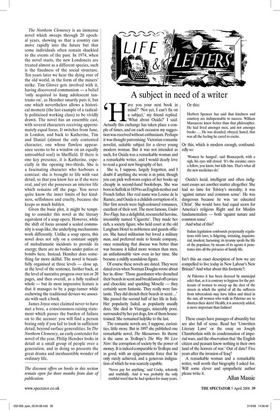A subject in need of a writer
‘Have you your next book in mind?’ ‘Not yet, I can’t fix on a subject,’ my friend replied. ‘What about Ouida?’ I said. Actually this exchange has taken place a couple of times, and on each occasion my suggestion was received without enthusiasm. Perhaps it was thought patronising: Victorian romantic novelist, suitable subject for a clever young modern woman. But it was not intended as such, for Ouida was a remarkable woman and a remarkable writer, and I would dearly love to read a good new biography of her.
She is, I suppose, largely forgotten, and I doubt if anything she wrote is in print, though you can pick well-worn copies of her books up cheaply in second-hand bookshops. She was born in Suffolk in 1839 to an English mother and French father. Her real name was Louise de la Ramée, and Ouida is a childish corruption of it. Her first novels were high-coloured romances, excellent of their sort. The most famous, Under Two Flags, has a delightful, resourceful heroine, irresistibly named ‘Cigarette’. They made her rich, a society figure, who held court at the old Langham Hotel to noblemen and guards officers. She hated militarism but loved a military man, and preferred male to female company, once remarking that disease was better than war because it killed more women than men, an unfashionable view even in her time. She became a mildly scandalous figure.
Of course these novels are dated. They were dated even when Norman Douglas wrote about her in Alone: ‘Those guardsmen who drenched their beards in scent and breakfasted off caviare and chocolate and sparkling Moselle — they certainly seem fantastic. They really were fantastic. They did drench their beards in scent...’ She passed the second half of her life in Italy. Her popularity faded, as popularity usually does. She died in Viareggio, miserably poor, surrounded by her pet dogs, few of them housetrained. She remained ladylike to the last.
The romantic novels are, I suppose, curiosities, little more. But in 1897 she published one remarkable novel, The Massarenes. Its theme is the same as Trollope’s The Way We Live Now: the corruption of society by the power of money. It is indeed comparable to Trollope and as good, with an epigrammatic force that he only rarely achieved, and a generous indignation of which he was scarcely capable.
‘Never pay for anything,’ said Cocky, solemnly and truthfully. And it was probably the only truthful word that he had spoken for many years.
Or this:
Herbert Spencer has said that kindness and courtesy are indispensable to success. William Massarene knew better than that philosopher. He had lived amongst men, and not amongst books .... He was dreaded, obeyed, hated; that was all the feeling he cared to excite.
Or this, which is modern enough, confoundedly so:
‘Women be hanged’, said Brancepeth, with a sigh, his eyes still closed. ‘It’s the cocaine; cures a fellow, you know, but kills him. That’s what all the new medicines do.’
Ouida’s lucid, intelligent and often indignant essays are another matter altogether. She had no time for Tolstoy’s morality; it was ‘against nature and common sense’. He was dangerous because he was ‘an educated Christ’. She would have had equal scorn for America’s religious Right and for Muslim fundamentalists — both ‘against nature and common sense’.
And what of this?
Italian legislation confounds perpetually regulations with laws; is fidgeting, irritating, inquisitorial, insolent, harassing; its tyranny spoils the life of the populace; by means of its agents it penetrates into all the privacies of family life.
Isn’t this an exact description of how we are compelled to live today in New Labour’s New Britain? And what about this footnote?:
At Palermo it has been decreed by municipal edict that, as it is contrary to hygiene for the petticoats of women to sweep up the dust of the streets in which the spittal of all the sufferers from tuberculosis may have fallen and dried in the sun, all women who walk in Palermo are to shorten their skirts! Health, it is austerely added, is more important than fashion!
These essays have passages of absurdity but are also full of sense. Read her ‘Unwritten Literary Laws’ or the essay on Joseph Chamberlain with its condemnation of imperial wars, and the observation that ‘the English citizen and peasant know nothing in their own land of the horrors of war.’ Out of date? Five years after the invasion of Iraq?
A remarkable woman and a remarkable writer, well worth that biography I asked for. Will some clever and sympathetic author please write it.
Allan Massie


































































 Previous page
Previous page